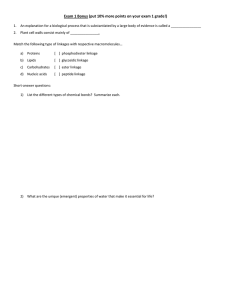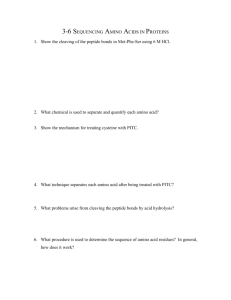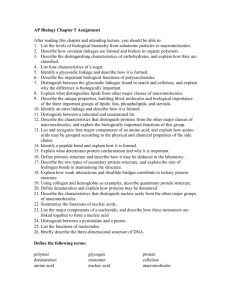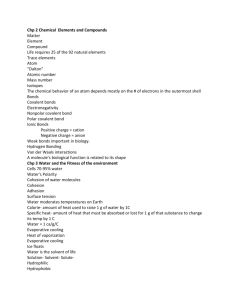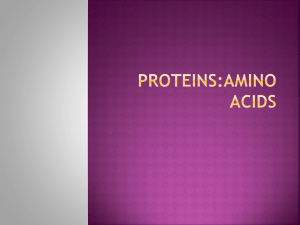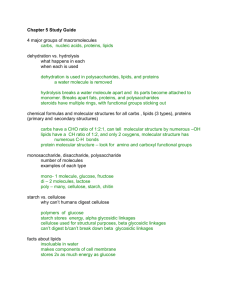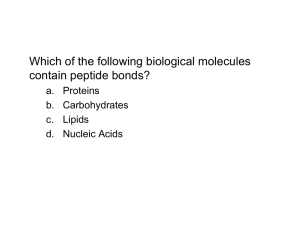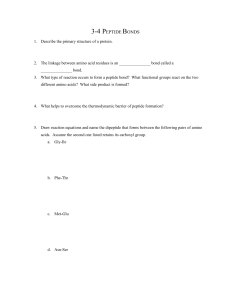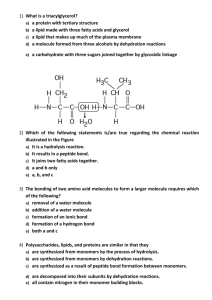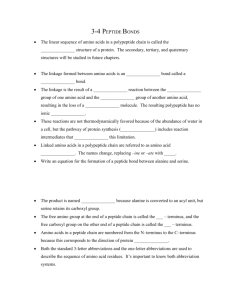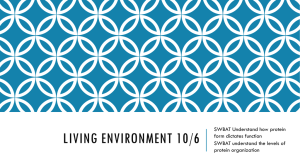Macromolecules Quiz: Bio1406 Review Questions
advertisement
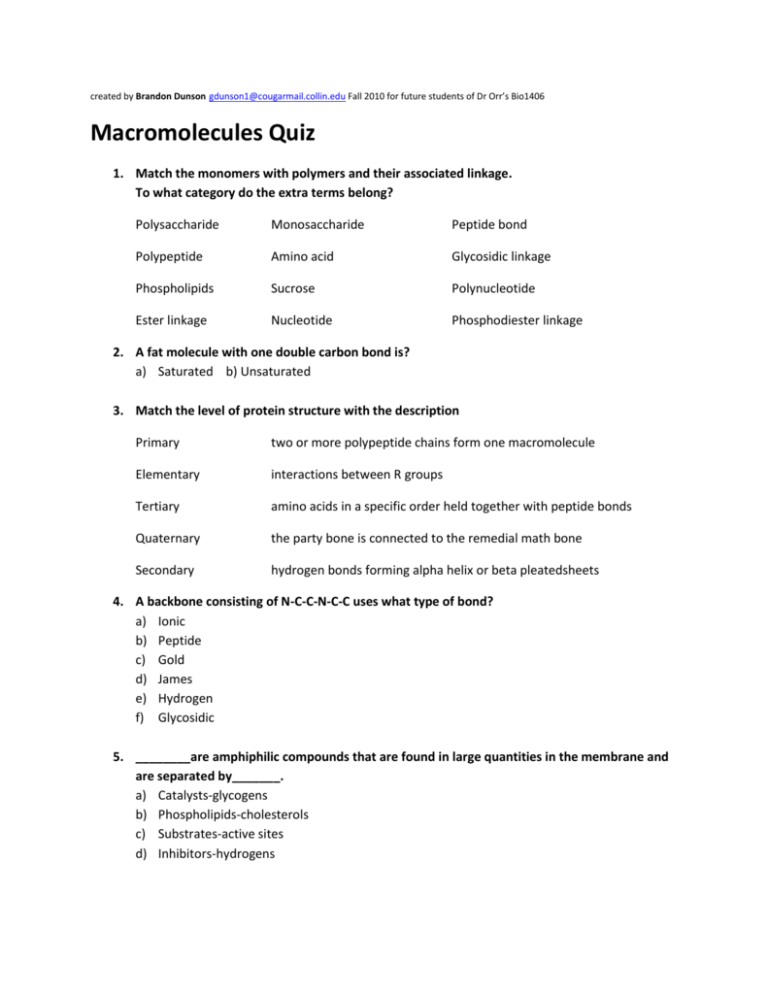
created by Brandon Dunson gdunson1@cougarmail.collin.edu Fall 2010 for future students of Dr Orr’s Bio1406 Macromolecules Quiz 1. Match the monomers with polymers and their associated linkage. To what category do the extra terms belong? Polysaccharide Monosaccharide Peptide bond Polypeptide Amino acid Glycosidic linkage Phospholipids Sucrose Polynucleotide Ester linkage Nucleotide Phosphodiester linkage 2. A fat molecule with one double carbon bond is? a) Saturated b) Unsaturated 3. Match the level of protein structure with the description Primary two or more polypeptide chains form one macromolecule Elementary interactions between R groups Tertiary amino acids in a specific order held together with peptide bonds Quaternary the party bone is connected to the remedial math bone Secondary hydrogen bonds forming alpha helix or beta pleatedsheets 4. A backbone consisting of N-C-C-N-C-C uses what type of bond? a) Ionic b) Peptide c) Gold d) James e) Hydrogen f) Glycosidic 5. ________are amphiphilic compounds that are found in large quantities in the membrane and are separated by_______. a) Catalysts-glycogens b) Phospholipids-cholesterols c) Substrates-active sites d) Inhibitors-hydrogens 6. One of these is not a storage carbohydrate… a) Starch b) Glycogen c) Amylopectin d)Amylose e)Cellulose 7. The functional groups -NH2 and –COOH are parts of every a) Carboxyl b) amino acid c) disaccharide d)nucleic acid 8. The synthesis from monomer to polymer requires… a) Hydrolysis b) dehydration reaction c)proton pumps d)two words I don’t use 9. Enzymes are usually ________ that are _______ and increase the number of_______in a reaction. a) Proteins-organic-products b) Substrate-inhibitors-reactants c) Inhibitors-active site-products d) Polysaccharides-polar covalent-reactants 10. Human digestion cannot break down which type of Carbohydrate? a) Glucose b) Sucrose c) Fructose d)Cellulose e)Glycogen 11. A catalyst is a) a substance mainly made up of lipids and the occasional starch b) a trace element in a compound toxic to plants c) unchanged by the chemical reaction whose rate it increases d) irreversible when it binds to the active site of protein 12. Chitin is a _______ used to make surgical thread and is a _______ that uses ______. a) Protein-monomer-ATP b) Lipid-polymer-ester linkages c) Carbohydrate-polymer-peptide bonds d) Carbohydrate-polymer-glycosidic bonds 13. Mix-n-Match Carbohydrate Lipid Protein Nucleic Acid Energy Storage Stores Inherited Info. Primary Fuel Movement, Protection from Disease 14. A ______ protects and helps fold a protein. The protein is released in _____form and if pH, temperature and salt concentration are not at optimal level it can become___________. a) Gap junction-tertiary-catalytic b) Vacuole-secondary-irreversible c) Chaperonin-tertiary-denatured d) Glycolipid-solvent-inorganic 15. Ribosomes are responsible for… a) Fuel storage b) Breakdown of chloroplast c) Protein synthesis d) The stiff outer layer in plant cells 16. The ‘m’ in mRNA stands for a) Messenger b) Membrane c) Main d) Medicare 17. One difference between Aldoses and Ketoses is… a) The location of the nucleus b) The location of the carbonyl group c) The location of the carboxyl group d) The location of the hard drive 18. Macromolecules are composed of ____________ covalently connected atoms. a) 7 b) 128 c) 219 d) Thousands 19. _________ tendency to lie at the interface between non-polar and aqueous polar environments makes them important components of cell membranes. a) An integral proteins b) Phospholipids c) Oxygen d) David Hasselhoff’s Created by Brandon Dunson Fall 2010 gdunson1@cougarmail.collin.edu

